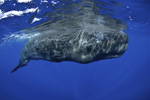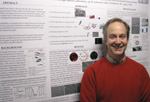|
By Dawn Brazell
Public Relations
Some life events seem just too good to be true. That's why researcher
Emily Allen found herself repeatedly refreshing the online website to
see her name listed as a recipient of the three-year, prestigious
National Science Foundation's Graduate Research Fellowship Program
(GRFP).
  Emily Allen, biomedicine researcher,
studies pygmy sperm whales. Like the sperm whales pictured above, these
deep divers offer clues to how they thrive under pressure. Emily Allen, biomedicine researcher,
studies pygmy sperm whales. Like the sperm whales pictured above, these
deep divers offer clues to how they thrive under pressure.
"I
didn't really believe it," she said. "I think ecstatic disbelief may
describe part of what I was feeling. I must have refreshed the page
over 50 times in the hour and a half after results were posted. I feel
honored to receive the award."
For good reason.
Eric Lacy, Ph.D., director
of the Marine Biomedicine and Environmental Sciences (MBES) Center,
said that MUSC has received only one of these highly-competitive awards
previously, despite annual submissions for decades. "Proudly, I must
say that the other award also came to an MBES student. Nonetheless,
Emily's accomplishment with her mentor, Dr. Demetri Spyropoulos, is a
coup for MUSC and the Marine Biomedicine Center."
Allen, a doctoral student
in MBES, will be studying the amazing but highly elusive member of the
toothed whales, the pygmy sperm whale. Her mentor, Spyropoulos, Ph.D.,
said the award speaks volumes about Allen, the MBES center and the
Oceans & Human Health Training program.
"Emily is a very bright,
motivated and engaging individual. She has had interdisciplinary
research experiences in marine, earth, and physical sciences," he said.
"She cares greatly about the environment and human health and has been
very involved in making a positive impact on the teaching, public
education and policy-making levels and within the natural world."
Originally on a pre-med
track, Allen said she got sidetracked when she took a Wood's Hole SEA
semester that put her on a large, research sailing vessel for a trip
across the Pacific. The Maine native who grew up on the coast was
hooked. When she found MUSC's program that blends marine science and
biology, she found she could combine both of her loves.
Allen's research focuses
on the pygmy sperm whale. Though the mammal is a small to mid-sized
whale, it can reach the depths of the larger deep divers, such as the
blue whale. Humans cannot withstand that kind of pressure, so it's
amazing how these animals can, she said.
"One of the interesting
things about their physiology is the deep-diving part because their
bodies are able to withstand intense pressures. When you go down to
that depth, in addition to high levels of compression, the conditions
are also very hypoxic, and their bodies are able to compensate for
these extreme conditions. Their physiological differences from other
animals are interesting in their own right."
The pygmy sperm whale is
among the deepest diving mammals, spending up to 90 minutes at depths
of up to 2000 meters or about 1.24 miles. This feat is done with very
little time on the surface and without the decompression dives that
larger deep diving mammals do.
To put this in context,
Spyropoulos said the maximum dive time for a person at 1/100th the
depth that the whale can reach is 45 minutes without decompression and
that divers have to wait a whole day before diving again to the same
depth while still loosing 10 percent of their dive time for safety
reasons.
"We think that the extreme
adaptation of the pygmy sperm whale to long periods of high pressure
and low oxygen makes them ideal candidates for learning about cellular
and molecular processes that could help divers with the bends and
people with breathing disorders," said Spyropoulos. "We also
believe that their extreme lifestyle may make them highly susceptible
to anthropogenic toxins."
Spyropoulos said the
project really took off when Allen's mentor and his close collaborator
John Baatz, Ph.D., and their group developed a procedure for freezing
live lung tissue from deceased and stranded pygmy sperm whales that
have washed up on the South Carolina coastline. They were able to
salvage a variety of viable lung cell types from these frozen tissue
samples, which will be of great use in the banking of rare and
endangered species, he said. They were also able to take one cell type,
the fibroblast, and induce it to behave like stem cells.
"With these stem cells, we
have the potential to generate many more cell types and tissues of the
body beyond those of the lung."
 Dr. John
Baatz and colleagues developed a procedure for freezing live lung
tissue from deceased and stranded pygmy sperm whales that has led to
important research applications. Dr. John
Baatz and colleagues developed a procedure for freezing live lung
tissue from deceased and stranded pygmy sperm whales that has led to
important research applications.
Spyropoulos said these
cell types and reconstructed tissues will be used to study normal
functions under stress and their responses to toxins, such as liver
toxicity and enlarged (hypertrophic) heart syndrome that the pygmy
sperm whales experience. The stem cells themselves also can be studied
for their regenerative capacity under stress, which may be more
critically important in high-endurance, extreme environments.
"In Emily's work, there's
potential benefit for us and those around us, and a heightened
appreciation for life in general on this incredible planet."
Allen said she's
excited because the research will be breaking new ground. "It can go a
lot of ways. I'm sure it will evolve like any research. There's a lot I
can look at. That's one of the exciting parts. I can't derail on this
one."
Its medical applications are wide open from shedding light on ways to
help divers and astronauts dealing with unusual pressure conditions and
extreme G-forces to the exciting frontier into the mysteries of how
cells differentiate.
"I think one reason
it got funding was because it's basic biology. It's looking at the
characteristics of induced pluripotent stem cells (iPS) between
species. It's seeing the differences in the expression of genes or
proteins or molecules that could change their actual physiology. Maybe
there's something innate about them that's different and that would
contradict everything we think we know about stem cells."
Researchers have
figured out how to make such cells as hepatocytes of the liver and
cardiomyocytes of the heart. How they respond to stress and toxins and
how they regenerate—is a critical area of exploration with many
practical medical applications. "It's really important to know exactly
where the differentiation potential comes from and what the differences
between species or even within a species are. It all sheds light on the
bigger mystery."
Allen has no doubt
the marine world holds important clues, and she loves that she can help
unlock some of the secrets of the deep. "There's a big undiscovered
pool of knowledge out there."
|





 Dr. John
Baatz and colleagues developed a procedure for freezing live lung
tissue from deceased and stranded pygmy sperm whales that has led to
important research applications.
Dr. John
Baatz and colleagues developed a procedure for freezing live lung
tissue from deceased and stranded pygmy sperm whales that has led to
important research applications.